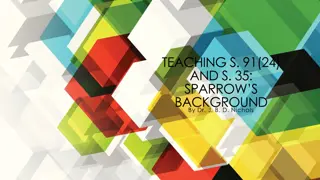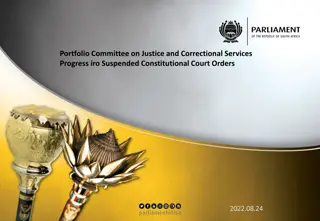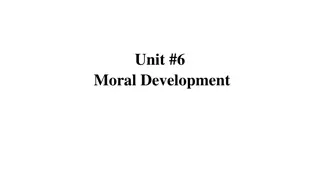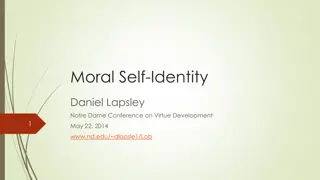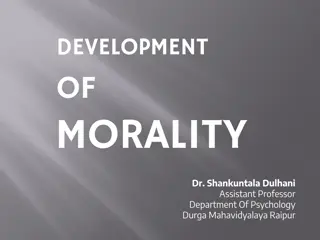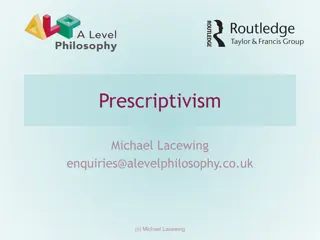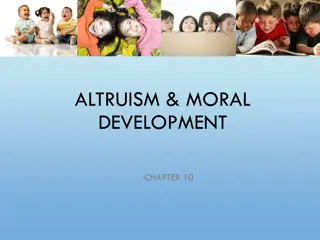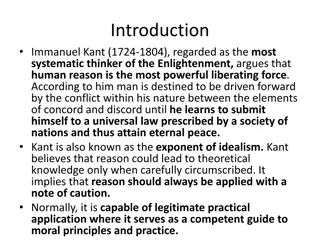Understanding Moral and Constitutional Values in Relation to Judiciary
Explore the concepts of moral values and constitutional values, emphasizing their importance in decision-making processes and societal norms. Discover the stages of moral development and delve into constitutional values such as sovereignty, socialism, secularism, democracy, justice, liberty, equality, fraternity, dignity, unity, and integrity. Gain insights on aligning moral and constitutional values within the judiciary for upholding ethical standards and democracy.
Download Presentation

Please find below an Image/Link to download the presentation.
The content on the website is provided AS IS for your information and personal use only. It may not be sold, licensed, or shared on other websites without obtaining consent from the author. Download presentation by click this link. If you encounter any issues during the download, it is possible that the publisher has removed the file from their server.
E N D
Presentation Transcript
Moral Values V. Constitutional Values Dr. Pawan Kumar Singh Professor; IIM Indore pawan @ iimidr.ac.in
Objectives To Understand Moral Values To Discuss Constitutional Values Upholding Moral and Constitutional Values and Aligning the Two in Judiciary
Moral Values Moral: Personal standards of thoughts and conduct that indicate how one should behave based on duties and virtues arising from principles about right and wrong. Moral Reasoning: Process by which we transform our values and beliefs into action. This reasoning affects the way one make decisions. Ethics: Social norms of standards of conduct that indicate how one should behave based on duties and virtues arising from principles about right and wrong. Values: Core belief or desires that guide or motivate attitudes and actions. Alternatively, basic convictions that a specific mode of conduct or end-state of existence is personally or socially preferable to an opposite or converse mode of conduct or end-state of existence
Values quips The things which are most valuable are priceless. The things in life that count most are the things that can not be counted. Man possessing riches is ok but riches possessing man is not ok. My purse is full but soul is suffering starvation! When money is chased wrongly we loose the things that money can not buy. Do not reject something merely because it is old-fashioned otherwise the sun and the moon and mother s love would be ruled out. The things of greatest value in life are those things which multiply when divided. If interest is not paid on moral obligation, spiritual bankruptcy is inevitable.
Moral Values: an exercise Value System shows intensity of Values (Activity: Rank from 1 to 7, 1 being most important) Prosperity Contribution Peace Freedom Respect Recognition Wisdom
Stages of Moral Development Sticking to rules to avoid physical punishment Following rules only when it is in your immediate interest Living up to what is expected by people close to you Maintaining conventional order by fulfilling obligations to which you have agreed Valuing rights of others, and upholding values and rights regardless of the majority s opinion Following self-chosen ethical principles even if they violate law
A Discussion on Constitutional Values Sovereignty Socialism Secularism Democracy Republican Character Justice: social, economic, political Liberty: thought, expression, belief, faith, worship Equality: status, opportunity Fraternity Dignity of individual, and Unity & integrity of nation
Conflict between Societal Norms and Organisational Counternorms: Example from Management Field Be open and honest :---------: Be secretive and deceitful Follow rules at all costs :---------: Do anything to get job done Take responsibility :---------: Pass the buck Be a team player :---------: Take credit for own and others actions
Resolving Dilemma Abate: Reduce the number of situations being counted as situation of ethical dilemma. Where choice is as clear as between black and white, choose the white. Negate: Do not arrive logically to a no , if you want to say no to an offer. First say no , and then substantiate, if required. State: In the given episode, do adequate communications. Debate: In many situations, choice is not as clear as between black and white. There is gray area also in the realm of choice of action. Create healthy atmosphere to discuss the issues for more clarity. Relate: Relate your choice of action to your past experience and to the past and present experiences of others. Empathize and see yourself keeping in the position of others. Contemplate: Ponder over the dilemma you are facing. Visualize the outcomes of the chosen action. Ask if the chosen action strengthens you in the long-run or it weakens you. Actions should make an individual stronger and further stronger. Meditation: Meditation word has become fashionable though as a complete process it is difficult to practice. Let us take meditation as being with oneself. Hours and hours in a day we devote to others (without). Few minutes if reserved for oneself by being merely with oneself without doing anything (being within) cleans the conscience which is the seat of making choice of action. Operate: Make a choice of action and implement it in life, or in organisation. Perpetrate: Once an action has been finalized, satisfying your parameters of ethical choice, stick to your gun. Stick to your gun not for the sake of proving yourself special but with sense of humility for the sake of broader issues.




